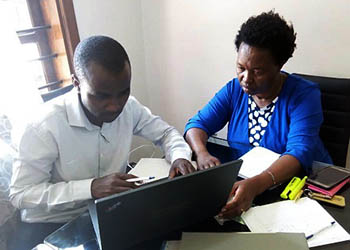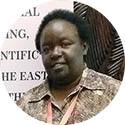
Capacity development and training
Training opportunities are a key component of our programme.
We aim to build research skills and competencies among health professionals in our partner countries and build capacity among UK members in global health research.
Our capacity development programme follows the following format:
- identify learning and training needs;
- develop and adapt appropriate resources;
- delivery of capacity development through in-country training, remote training sessions, annual group meetings and support delivered between partner countries (referred to as ‘south to south’ training);
- monitoring and evaluation to assess effectiveness and identify areas for ongoing work.
Our capacity development programme is delivered through a number of training opportunities such as:
Induction training
Induction training sessions for Research Assistants (RAs) take place either at The University of Manchester or in partner countries. During the induction sessions, RAs learn about maternity care in the UK with specific information about the care that mothers receive following stillbirth.
RAs also receive refresher training on research methodologies, including:
- a review of quantitative methods and clinical audits;
- an overview of qualitative methodologies and ethnography;
- an introduction to Patient and Public Involvement (PPI).
RAs also participate in a social programme to promote peer support and knowledge sharing between partner country teams.
Annual meetings
Teams of researchers from the Lugina Africa Midwives Research Network (LAMRN) countries and the UK attend annual meetings which take place in a different LAMRN region each year. Annual meetings provide opportunities for networking and progress updates from each country, with teams identifying the key issues that have arisen in their region.
In-country training or ‘south to south training’
 Project Leads and other team members in our partner countries deliver training sessions to other colleagues across Africa. These training sessions contribute to our programme’s sustainability by facilitating communication and knowledge-sharing between teams in our partner countries.
Project Leads and other team members in our partner countries deliver training sessions to other colleagues across Africa. These training sessions contribute to our programme’s sustainability by facilitating communication and knowledge-sharing between teams in our partner countries.
Remote training
Meetings and training sessions are delivered remotely via platforms such as Skype and Zoom, allowing our teams to receive refresher training sessions on the use of tools such as the REDCap Mobile App for data collection.
Accessing formal research qualifications
Formal research training embeds capacity and helps to support the development of research leadership in our partner countries, with a supportive infrastructure enhancing sustainability beyond current funding.
Through our programme, LAMRN midwives have accessed formal research qualifications through participation in the Master of Clinical Research programme at The University of Manchester.
The programme has been successful in securing additional external funding to support a post-doctoral researcher working in Tanzania, and also a midwife from Zimbabwe to study for a PhD at The University of Manchester.
Mrs Anne Nendela
 LAMRN Kenya (studying for an MSc in Clinical Research, The University of Manchester)
LAMRN Kenya (studying for an MSc in Clinical Research, The University of Manchester)
“Studying research at Master’s level has been my dream and The University of Manchester has given me this opportunity.”
In Kenya, Anne is studying women’s experiences of care following stillbirth and obstetric fistula (when a hole develops in the birth canal due to prolonged labor). This research will enhance knowledge about the physical and psychological impact of stillbirth and fistula on women and help design better care for them.
Mrs Chowa Tembo Kasengele
 LAMRN Zambia (studying for an MSc in Clinical Research, The University of Manchester)
LAMRN Zambia (studying for an MSc in Clinical Research, The University of Manchester)
“As a young midwife I read articles from the School of Midwifery at The University of Manchester and I wondered if I could ever have the opportunity to study there. Now that dream has become true thanks to this project,” said Chowa.
Chowa is studying how women’s experiences of care following a stillbirth are impacted by traditional cultural factors such as the role of the mother-in-law. The outcomes of the study will help the Zambian Ministry of Health to design community-based interventions to support and care for these mothers in their settings.
Our quarterly newsletter also provides updates on our network’s training activities:
